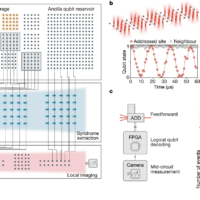- R. A. Bravo, T. Patti, K. Najafi, X. Gao, and S. Yelin. Expressive quantum perceptrons for quantum neuromorphic computing. Quantum Science and Technology , 10(1), January 2025.
- D. Bluvstein, M. Cain, N. Maskara, X. Gao, M. Lukin, M. Gullans, D. Hangleiter, M. Kalinowski, and A. Kubica. Fault-tolerant compiling of classically hard IQP circuits on hypercubes. ArXiv 2024.
- X. Gao, M. Kalinowski, M. Lukin, S. Choi, Chi-Ning Chou, and Boaz Barak. Limitations of Linear Cross-Entropy as a Measure for Quantum Advantage. PRX Quantum February 2024.
- X. Gao, S. Yelin, K. Najafi, and W. Zhong. Many-body localized hidden generative models. Phys Rev Research, 6(043041), October 2024.
- D. Bluvstein, S. Evered, H. Zhou, T. Manovitz, S. Ebadi, M. Cain, M. Kalinowski, N. Maskara, I. Cong, X. Gao, G. Semeghini, M. Gullans, M. Greiner, V. Vuletic, M. Lukin, A. Geim, S. H. Li, D. Hangleiter, J. P. B. Ataides, P. S. Rodriguez, and T. Karolyshyn. Logical quantum processor based on reconfigurable atom arrays. Nature, 626:58–65, December 2023.
- X. Gao, S. Yelin, K. Najafi, and W. Zhong. Many-body localized hidden Born machine. ArXiv 2022.
- S. Ebadi, A. Keesling Contreras, M. Cain, T. Wang, H. Levine, D. Bluvstein, G. Semeghini, A. Omran, J. Liu, B. Nash, X. Gao, L. Zhou, S. Choi, H. Pichler, S. Wang, M. Greiner, V. Vuletic, M. Lukin, Rhine Samajdar, Xiu-Zhe Luo, Boaz Barak, Edward Farhi, Subir Sachdev, and Nathan Gemelke. Quantum Optimization of Maximum Independent Set using Rydberg Atom Arrays. Science May 2022.
- R. A. Bravo, K. Najafi, X. Gao, and S. Yelin. Quantum reservoir computing using arrays of Rydberg atoms. PRX, 3(030325), August 2022.
- R. A. Bravo, K. Najafi, T. Patti, X. Gao, and S. Yelin. Universal Quantum Perceptrons for Quantum Machine Learning. ArXiv 2022.
- T. Patti, K. Najafi, X. Gao, and S. Yelin. Entanglement Devised Barren Plateau Mitigation. Phys. Rev. Research, 3(033090), July 2021.
